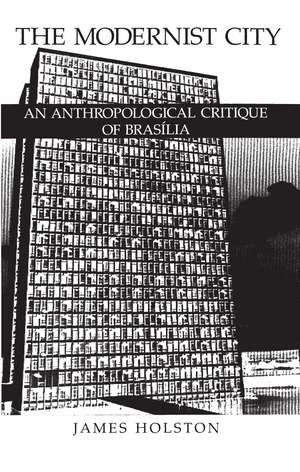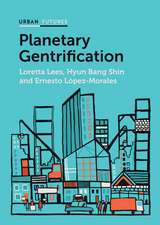The Modernist City: An Anthropological Critique of Brasilia
Autor James Holstonen Limba Engleză Paperback – 8 sep 1989
The utopian design and organization of Brasília—the modernist new capital of Brazil—were meant to transform Brazilian society. In this sophisticated, pioneering study of Brasília from its inception in 1957 to the present, James Holston analyzes this attempt to change society by building a new kind of city and the ways in which the paradoxes of constructing an imagined future subvert its utopian premises. Integrating anthropology with methods of analysis from architecture, urban studies, social history, and critical theory, Holston presents a critique of modernism based on a powerfully innovative ethnography of the city.
Preț: 419.24 lei
Nou
Puncte Express: 629
Preț estimativ în valută:
80.23€ • 82.88$ • 66.77£
80.23€ • 82.88$ • 66.77£
Carte tipărită la comandă
Livrare economică 25 martie-08 aprilie
Preluare comenzi: 021 569.72.76
Specificații
ISBN-13: 9780226349794
ISBN-10: 0226349799
Pagini: 383
Ilustrații: illustrations, 17 tables, 8 maps
Dimensiuni: 168 x 238 x 23 mm
Greutate: 0.54 kg
Ediția:1
Editura: University of Chicago Press
Colecția University of Chicago Press
ISBN-10: 0226349799
Pagini: 383
Ilustrații: illustrations, 17 tables, 8 maps
Dimensiuni: 168 x 238 x 23 mm
Greutate: 0.54 kg
Ediția:1
Editura: University of Chicago Press
Colecția University of Chicago Press
Cuprins
List of Illustrations
List of Tables
Acknowledgments
Part 1: The Myth of the Concrete
1. Premises and Paradoxes
Anthropology and Modernism
The Idea of Brasília
The Instruments of Change
The Negation of the Negation
2. Blueprint Utopia
Brasília's Pedigree
The Modernist Project
3. The Plan's Hidden Agenda
Plan Mythology
The Hidden Agenda
Brasília's Development Inversions
The Exemplary Center
Niemeyer's Social Architecture
Modernism and Modernization
The Counter-Brincadeira
Part 2: The City Defamiliarized
4. The Death of the Street
The Architectural Context of Street Life
The Solid-Void/Figure-Ground Convention
The Street in Ouro Preto: Private Property and Public Display
The Modernist Inversion
Transforming Civic Discourse: The New Public of Brasília
5. Typologies of Order, Work, and Residence
Zoning the City: A Typology of Form and Function
The Monumental Work Sectors
The Superquadra Solution
The Apartment Plan
The Apartment Façade
Part 3: The Recovery of History
6. Rights to the City
Populating an Idea: Differential Incorporation
The Recruitment of Pioneers
Discourses of Participation: Reinventing the Nation
The Labor Market
Recruitment
Rights, Privledges, and Powers
From Interests to Actions
7. Cities of Rebellion
The Illegal Periphery
The Legal Periphery
Political-Administrative Organization: The Climate of Tranquility
Space and Society: An Absolute Predominance of Public Servants
8. The Brazilianization of Brasília
The Periphery in Time and Space
The Squatter Settlement of Vila Chaparral
Center Street, Sobradinho
The City Familiarized
Concluding Remarks
Notes
Bibliography
Index
List of Tables
Acknowledgments
Part 1: The Myth of the Concrete
1. Premises and Paradoxes
Anthropology and Modernism
The Idea of Brasília
The Instruments of Change
The Negation of the Negation
2. Blueprint Utopia
Brasília's Pedigree
The Modernist Project
3. The Plan's Hidden Agenda
Plan Mythology
The Hidden Agenda
Brasília's Development Inversions
The Exemplary Center
Niemeyer's Social Architecture
Modernism and Modernization
The Counter-Brincadeira
Part 2: The City Defamiliarized
4. The Death of the Street
The Architectural Context of Street Life
The Solid-Void/Figure-Ground Convention
The Street in Ouro Preto: Private Property and Public Display
The Modernist Inversion
Transforming Civic Discourse: The New Public of Brasília
5. Typologies of Order, Work, and Residence
Zoning the City: A Typology of Form and Function
The Monumental Work Sectors
The Superquadra Solution
The Apartment Plan
The Apartment Façade
Part 3: The Recovery of History
6. Rights to the City
Populating an Idea: Differential Incorporation
The Recruitment of Pioneers
Discourses of Participation: Reinventing the Nation
The Labor Market
Recruitment
Rights, Privledges, and Powers
From Interests to Actions
7. Cities of Rebellion
The Illegal Periphery
The Legal Periphery
Political-Administrative Organization: The Climate of Tranquility
Space and Society: An Absolute Predominance of Public Servants
8. The Brazilianization of Brasília
The Periphery in Time and Space
The Squatter Settlement of Vila Chaparral
Center Street, Sobradinho
The City Familiarized
Concluding Remarks
Notes
Bibliography
Index










